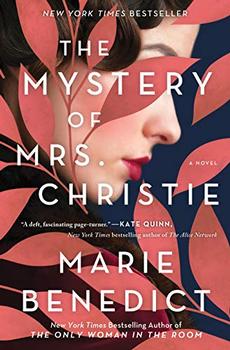Summary | Excerpt | Reading Guide | Reviews | Beyond the Book | Readalikes | Genres & Themes | Author Bio

"Sir," she says when he does not respond. "I do believe that this qualifies as an extreme emergency. Your wife is missing."
Chapter Three
THE MANUSCRIPT
October 12, 1912
Ugbrooke House, Devon, England
A murmur of surprise rose up from the revelers as the Irving Berlin tune became more recognizable. While the older guests seemed uncertain about the propriety of dancing to such a mod-ern song, my partner did not hesitate to pull me onto the dance floor. He led me directly into the bold one-step, and the younger set followed in our wake.
Without the intricate dance steps of the waltz to place distance between us, our bodies felt awfully close. It almost made me wish for the old-fashioned gowns with their armor of corsets. In an effort to create some sort of barrier between myself and this very forward stranger, however artificial, I kept my gaze fixed firmly over his shoulder. His eyes, however, never moved from mine.
Normally, my dance partners and I fell into easy chatter, but not this time. What could I say to such a fellow? Finally, he broke the silence. "You are even prettier than Arthur Griffiths described you."
I could not say which part of his remark astonished me more: the fact that I shared an acquaintance with this unusual man or that he had the audacity to call me "pretty" when we hadn't even been formally introduced. My set had firm rules governing our behavior, and although those unspoken guidelines had relaxed in recent years, commenting on my appearance right out of the gate broke even the loosest conventions. I were honest with myself, I found his candor refreshing, but girls like me weren't supposed to like directness. He'd left me with two choices—either to stomp away at his effrontery or to ignore it entirely. Given that this man intrigued me despite his gaffes, I chose the latter and benignly asked, "You know Arthur Griffiths?" The local vicar's son was a friend.
"Yes, we are both with the Royal Field Artillery, and I'm stationed with him at the garrison at Exeter. When he found out that he couldn't attend tonight because of his official duties, he asked me to come in his stead and look out for you."
Ah, well, that explained something, I thought. I met his gaze and dis-covered that his eyes were a remarkable bright-blue shade. "Why didn't you mention him straight off ?"
"I didn't know I needed to."
I did not state the obvious, that any young man from a good family knows how to make proper introductions, including a reference to your acquaintances in common. Instead, I fished around for a bland response and said, "He's a fine fellow."
"Do you know Arthur well?"
"Not very well, but he is a lovely friend. We met when I was staying with the Mathews at Thorp Arch Hall in Yorkshire, and we got on."
My dance partner—who still had not introduced himself by name—didn't respond. The silence bothered me, so I got chatty. "He's a good dancer."
"You sound as though you're disappointed I'm here instead of him."
I decided to see if this young man's mood could be lightened. "Well, sir, this is our first dance. And since you've liberated me from my dance card, you may yet have the chance for another to prove your dancing skills."
He laughed, a deep, rich sound. As he spun me around the floor, past the familiar faces of the Wilfreds and the Sinclairs, I laughed along with him, feeling quite different from those around me. Freer somehow. More alive.
"I intend to do precisely that," he said.
Emboldened, I asked him, "What is it that you do as an officer at Exeter?"
"I fly."
I froze for a moment. Everyone was mad for the notion of flying, and here I was dancing with a pilot. It was too thrilling. "You fly?"
His cheeks turned a fiery red, visible even in the low ballroom light. "Well, I'm actually a gunner at the moment, even though I'm the 245th qualified aviator in Britain. Soon enough, though, I'll be entering the newly formed Royal Flying Corps." His chest, already quite broad, puffed up a bit at this statement."
Excerpted from The Mystery of Mrs. Christie by Marie Benedict. Copyright © 2020 by Marie Benedict. Excerpted by permission of Sourcebooks. All rights reserved. No part of this excerpt may be reproduced or reprinted without permission in writing from the publisher.
To be ignorant of what occurred before you were born is to remain always a child
Click Here to find out who said this, as well as discovering other famous literary quotes!
Your guide toexceptional books
BookBrowse seeks out and recommends the best in contemporary fiction and nonfiction—books that not only engage and entertain but also deepen our understanding of ourselves and the world around us.